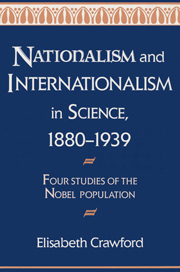Book contents
- Frontmatter
- Contents
- List of tables and figures
- Acknowledgment
- Introduction
- PART I CONCEPTUAL AND HISTORIOGRAPHICAL ISSUES
- PART II CRITICAL AND EMPIRICAL STUDIES
- 3 Internationalism in science as a casualty of World War I
- 4 Center-periphery relations in science: the case of Central Europe
- 5 National purpose and international symbols: the Kaiser-Wilhelm Society and the Nobel institution
- 6 Nobel laureates as an elite in American science
- Bibliographical essay
- Index
3 - Internationalism in science as a casualty of World War I
Published online by Cambridge University Press: 06 November 2009
- Frontmatter
- Contents
- List of tables and figures
- Acknowledgment
- Introduction
- PART I CONCEPTUAL AND HISTORIOGRAPHICAL ISSUES
- PART II CRITICAL AND EMPIRICAL STUDIES
- 3 Internationalism in science as a casualty of World War I
- 4 Center-periphery relations in science: the case of Central Europe
- 5 National purpose and international symbols: the Kaiser-Wilhelm Society and the Nobel institution
- 6 Nobel laureates as an elite in American science
- Bibliographical essay
- Index
Summary
In the history of international science, World War I has been regarded as the ultimate test of universalism, a test that in the opinion of most observers the scientists of the belligerent nations failed. That the war should have brought international scientific activities, including the award of the Nobel prizes, to an almost complete halt is not considered surprising, nor is it surprising that scientists served in the armed forces either in research and development or by fighting and dying in the trenches. What is at issue is the way many prominent scientists, particularly in Germany, sought and found their field of action in propaganda warfare, exhibiting the virulent form of nationalism known as chauvinism.
Acting together with scholars in the humanities and with writers and artists, they signed manifestoes, such as the Appeal of the Ninety-three Intellectuals issued in 1914, setting forth German war aims or repudiating Allied charges of German war crimes. Acting alone, they, as well as their Allied counterparts, wrote articles and pamphlets denigrating the claims of superior scientific achievement made by the other side. Many tried to persuade their correspondents, particularly when these were scientists in neutral countries such as the Netherlands and Sweden, that any or all of such actions were justified.
These activities prepared the ground for the postwar politics of international science, which became dominated by the Allied-sponsored International Research Council (IRC) set up in 1919. The policies of ostracism advocated by the IRC reflected a widespread opinion that Germany should be chastized.
- Type
- Chapter
- Information
- Nationalism and Internationalism in Science, 1880–1939Four Studies of the Nobel Population, pp. 49 - 78Publisher: Cambridge University PressPrint publication year: 1992
- 1
- Cited by

